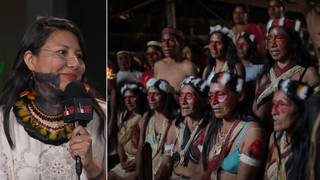
Arthur Kinoy, prominent civil rights lawyer, a founder of the Center for Constitutional Rights and a longtime member of the National Lawyers Guild died Friday at his home in New Jersey at the age of 82. We air an excerpt of a documentary by Abby Ginzberg featuring Kinoy, William Kunstler, Fannie Lou Hamer and Adam Clayton Powell Jr.
Arthur Kinoy, a founder of the Center for Constitutional Rights and a longtime member of the National Lawyers Guild died Friday at his home in New Jersey. He was 82 year old.
Kinoy was very active in the civil rights movement of the 50’s and 60’s and in representing witnesses called before the House Un-American Activities Committee, ultimately being called himself. He was also involved in some of the country’s most celebrated cases.
He worked on the 1950s espionage trial of Julius and Ethel Rosenberg, the only U.S. citizens to be executed for conspiracy to commit espionage and probably the most controversial death sentence in U.S. history.
Other high-profile cases included the trial of eight anti-war activists charged with conspiring to incite riots at the 1968 Democratic Convention in Chicago known as the Chicago Seven.
He took on President Richard Nixon in 1972, arguing before the U.S. Supreme Court that the use of the wiretaps was a violation of constitutional protections against unreasonable searches. He won that case and four others he argued before the court.
For much of the 1950s and 1960s he worked on behalf of the civil rights movement in the American South. In 1964, he joined the faculty at Rutgers University Law School, where he taught until his retirement in 1991.
In 1966, he helped found the Center for Constitutional Rights in New York, which is still active.
Supreme Court Justice Ruth Ginsburg said he was an “inspiration” to her.
In the National Lawyers Guild’s Disorientation Handbook Kinoy writes, “The test for a people’s lawyer is not always the technical winning or losing of the formal proceedings. The real test is the impact of the legal activities on the morale and understanding of the people involved in the struggle.”
- “Doing Justice: The Life and Trials of Arthur Kinoy”, courtesy of Abby Ginzberg. To order a copy of the full documentary email the filmmaker Abby Ginzberg.











Media Options